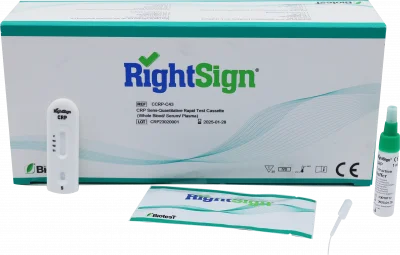Buy CRP Test
Our CRP tests at OdemShop allow for the precise measurement of C-reactive protein, a marker for inflammation in the body. They are easy to use and provide fast results.

CRP (C-Reactive Protein) Test
The C-reactive protein (CRP) blood test is a pivotal tool for healthcare professionals, including purchase managers, doctors, elderly homes, and pharmacies. This test plays a vital role in detecting inflammation and monitoring conditions such as infections, autoimmune disorders, and heart disease.
For medical professionals, understanding the fluctuations of CRP levels is crucial for devising effective treatment strategies and making informed decisions. A detailed interpretation of CRP test results is essential, as it goes beyond identifying high levels to understanding the complex pathophysiological mechanisms affecting its concentration.
Understanding CRP and Its Role in Inflammation
C-Reactive Protein (CRP) is a biomarker of inflammation. It produces CRP in response to inflammation, infection, and tissue injury.
When and Why CRP Blood Test is Recommended
Physicians often recommend the CRP blood test when there is a need to assess the presence and intensity of inflammation in a patient's body. Elevated levels of C-reactive protein can signal acute inflammatory responses due to various conditions.
The high-sensitivity CRP (hs-CRP) test is particularly useful for evaluating the risk of heart disease. Even minor increases in CRP can indicate cardiovascular risk.
Preparing for a CRP Blood Test
Understanding the importance of C-reactive protein (CRP) as an indicator of inflammation is crucial for medical professionals, including purchase managers at healthcare facilities, doctors, elderly home caretakers, and pharmacies. Proper preparation for a CRP blood test is essential to secure precise results.
Preparation Steps:
- Engage with a health care provider to authorize a CRP test.
- Adhere to any specific pre-test guidelines provided.
- Maintain adequate hydration for optimal vein access in the arm.
During the Test:
- A technician will collect a small blood sample from the arm.
After the Test:
- Await further instructions from the health care provider regarding post-test procedures.
It's important for professionals in the healthcare industry to understand and communicate the need for accurate inflammatory markers to ensure the highest quality of patient care. Proper preparation and follow-up are key steps in this process.
Understanding CRP Test Results
Interpreting the results of a CRP blood test is crucial for determining the presence and intensity of inflammation in the body.
Normal CRP levels typically indicate no significant inflammation, while elevated levels may suggest acute or chronic inflammatory conditions, necessitating further medical evaluation.
It is essential for healthcare professionals to understand the nuances of these results and the standard procedure for obtaining a blood sample to ensure accurate CRP measurement.
Normal CRP Levels in the Blood
C-reactive protein (CRP) levels within the blood are indicative of inflammation, with normal ranges typically falling below 10 mg/L in healthy individuals.
Understanding CRP Levels:
- CRP Blood Test: Utilized to measure CRP and assess inflammation.
- Normal CRP Levels: Generally below 10 mg/L.
- Interpreting the Results: C-reactive protein level within the normal range suggests minimal inflammation.
Interpreting Elevated CRP Levels
While a CRP level within the basic range indicates minimal inflammation, values above 10 mg/L may point to an underlying inflammatory condition that requires further medical evaluation.
High crp levels are associated with an increased risk of heart disease.
An elevation can signify ongoing inflammation in your body, often related to autoimmune disorders.
Prompt and precise interpretation of these results is critical for timely intervention.
What do the test results mean?
Understanding the results of a CRP blood test is crucial, as it helps reveal the level of inflammation in your body, which can indicate various health conditions.
What CRP Levels Can Tell You:
- Acute Inflammation: Shows if there's a sudden, intense inflammatory response.
- Chronic Inflammatory Diseases: Suggests ongoing, long-term inflammation.
If Levels Are High:
This signals a need for further investigation into potential health issues.
The test measures the amount of C-reactive protein in your blood. Always consult with a healthcare professional to discuss your results and decide on the next steps.
Procedure for Taking a Blood Sample
Understanding the significance of CRP levels is crucial for healthcare management. Here's a streamlined guide on the process of acquiring a blood sample for a CRP test, which is an essential procedure for Purchase Managers, Doctors, Elderly Homes, and Pharmacies.
A trained healthcare professional will carefully draw a blood sample from a vein, usually located on the inner elbow or the back of the hand. The collected blood is then placed into a sterile test tube or vial. This step is critical to ensure the accuracy of the test results.
What are the treatment options for an elevated CRP value?
There are several treatment options due to elevated CRP.
| Therapy | Description | Effectiveness of lowering CRP Levels |
|---|---|---|
| Medication | Administration of antibiotics or painkillers depending on the cause of the inflammation | High |
| Nutritional advice | Advice on good eating habits and patterns to prevent inflammation and improve overall health | Medium to high |
| Physiotherapy and exercise therapy | Carrying out special exercises under the guidance of a specialist to stimulate muscle growth and alleviate joint problems. | Low to medium |
It is therefore advisable to contact the attending physician to determine the best possible treatment for the individual case.
CRP Blood Test in Diagnosis and Monitoring
The C-reactive protein (CRP) blood test serves as a critical biomarker in the diagnosis and management of various inflammatory conditions, including autoimmune diseases and cardiovascular risks.
For instance, tracking fluctuations in levels is integral to assessing disease activity and therapeutic response in patients with rheumatoid arthritis.
Monitoring CRP Levels in Conditions like Rheumatoid Arthritis
In the management of rheumatoid arthritis, regularly monitoring C-reactive protein (CRP) levels is crucial for assessing inflammation and guiding treatment decisions.
Monitoring CRP Levels
- Rheumatoid Arthritis:Frequent checks help adjust therapy.
- Levels May Indicate:Flares or remission states.
- Test Measures Inflammation:Useful in other conditions like Crohn's disease and ulcerative colitis.

CRP Testing in Cardiovascular Disease Risk Assessment
Elevated CRP levels, beyond their role in inflammatory diseases, have emerged as a significant biomarker for assessing the risk of cardiovascular events.
High-sensitivity C-reactive protein (hs-CRP) tests offer a precise measure for evaluating potential heart disease.
Incorporating hs-CRP as part of a comprehensive risk assessment can enhance predictions of cardiovascular disease, guiding targeted prevention strategies and early interventions in at-risk individuals.
Using CRP Test in Inflammatory Bowel Disease Management
Building on the importance of CRP levels in systemic autoimmune conditions, the CRP blood test also serves as a valuable tool in the diagnosis and management of inflammatory bowel disease (IBD). The protein made by the liver, the C reactive protein, elevates the level of CRP in your blood during acute phases. Measuring the level of C-reactive protein can signal clinicians to test if you have symptoms indicative of IBD. This assists in assessing intestinal inflammation and guiding therapeutic interventions.
Understanding the Significance of C-Reactive Protein
C-Reactive Protein (CRP) is an acute-phase reactant synthesized by the liver, serving as a sensitive marker for inflammation within the body. Elevated levels of CRP are clinically significant, correlating with an increased risk for cardiovascular events and serving as a hallmark for various inflammatory conditions.
Understanding the implications of CRP concentrations—within normal or abnormal ranges—provides critical insight into a patient's inflammatory status and potential health risks.
CRP Levels as Indicators of Inflammatory Conditions
A CRP test may reveal high levels of crp, which often signify active inflammation within the body. This clinical assay measures the amount precisely, providing clinicians with critical insights.
Persistently elevated readings can be a sign that your treatment may require adjustment to better manage the inflammation.
Normal Range and Abnormal CRP Levels
Understanding the normal range for C-Reactive Protein (CRP) levels is critical for healthcare professionals when interpreting the results of this blood test. This knowledge helps differentiate between healthy individuals and those who may have an underlying condition causing inflammation.
The basic range for CRP levels typically falls below 10 mg/L. Abnormal CRP levels can vary depending on the amount of inflammation present. These abnormal levels can significantly affect your CRP level, indicating potential health issues.
Where to buy CRP Tests in Bulk / Wholesale
Procuring CRP tests in bulk or wholesale quantities can be efficiently accomplished through OdemShop, a reputable distributor known for their comprehensive service to various European enterprises.
Wholesale Solutions:
- Volume Discounts: Competitive pricing on large orders.
- Quality Assurance: Reliable CRP blood tests that accurately measure the level of C-reactive protein in the bloodstream.
- Efficient Distribution: Streamlined processes ensure prompt delivery to businesses.
Here to the main categories:
You might also be interested in

C-Reactive Protein/CRP
C-reactive protein, also known as CRP, is an important laboratory parameter for measuring acute inflammation in the body. It has proven to be useful in diagnosing potential health problems at an early stage and assisting patients in the best possible...
View post

